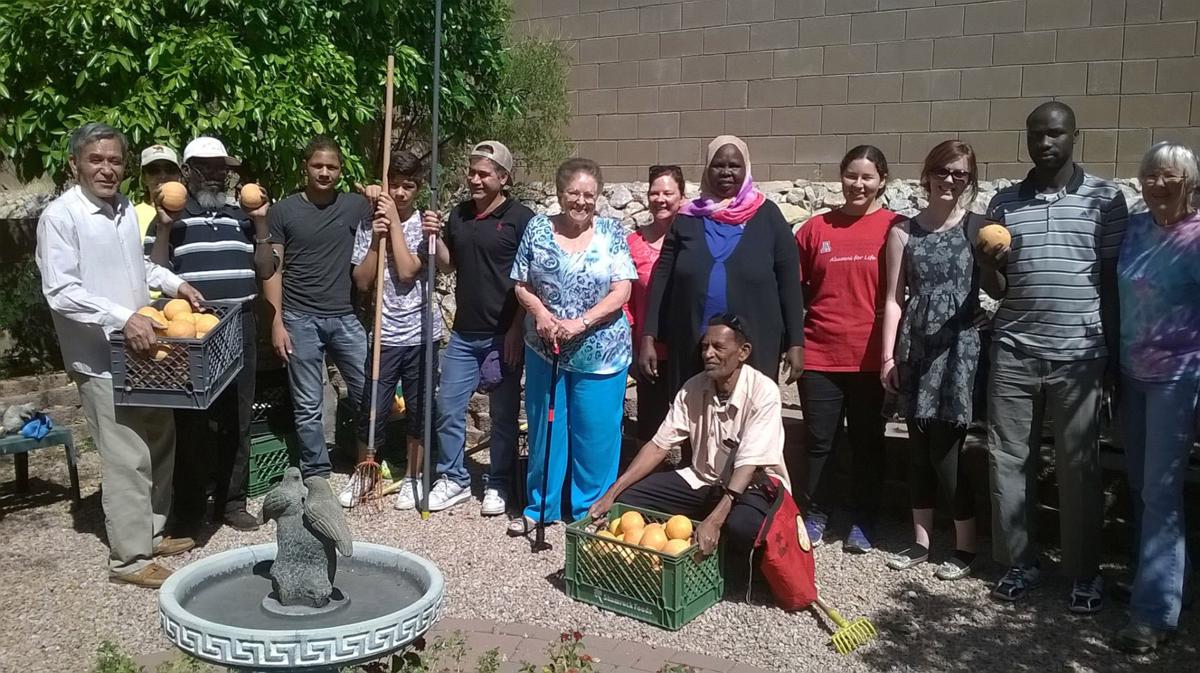Volunteers with Iskashitaa Refugee Network are harvesting more than food: They are reaping goodwill, economic sustainability and community investment for immigrants who have been displaced from their native countries.
“All immigrants want to integrate, but the ease with which they are able to do that varies from city to city,” said Barbara Eiswerth, who founded the organization after working with refugee students in 2003 to develop a harvesting network to glean citrus and other produce that was going to waste throughout the city. “It is imperative that new arrivals feel welcomed into the community and we try to provide them with opportunities to attend harvests, farmers markets, street fairs and other events around the city to help improve their English skills, their confidence and their ability to get work. We are trying to increase their employability and increase their cultural orientation through experiential learning.”
Named for the Somali and Maay Maay word for “working cooperatively together,” Iskashitaa combines the efforts of hundreds of volunteers who work alongside United Nations refugees in partnership with agencies and faith organizations.
Iskashitaa programs range from harvesting and food preservation workshops to mobile produce rescue from Mexico and field trips to agricultural venues such as conventional farms, hydroponic greenhouses, mushroom farms and gardens.
The harvesting experiences provide opportunities for volunteers and refugees to learn to identify, harvest, use and store locally-grown produce while food workshops provide training in food safety and processing along with preparation for jobs in the food service industry. Participants also learn skills in irrigation, cultivation and desert gardening.
Eiswerth said the intent of the innovative, food-based programming is to assist refugees with self-sufficiency and citizenship while reducing food waste and increasing food security throughout the entire community. The organization identifies, gleans and redistributes more than 60 tons of produce annually to hundreds of underserved families. About 40 percent of the food harvested is donated to food banks and soup kitchens.
The refugees, who represent more than 30 ethnic backgrounds from across Africa, Asia and the Middle East, bring eye-opening perspectives to share with volunteers, Eiswerth said.
“Most refugees who come are much more connected to food and food sources than Americans: There are even some who don’t come from societies where they went to grocery stores. They grew everything they ate or went to farms. In Tucson about 95 percent of the time, people don’t harvest fruit from their yards. Iskashitaa has harvested more than 80 different types of foods, some of which are completely unknown to Tucsonans,” Eiswerth said.
Iskashitaa hopes to improve on those statistics by utilizing customized workshops and tours to promote public awareness about the many edible desert fruits beyond citrus — such as barrel cactus and prickly pear, carob, dragonfruit, Peruvian apple, pomegranate and fig.
Utilizing food efficiently is ultimately vital to the entire community, said Jack Speelman, a senior in the UA College of Engineering who volunteers with Iskashitaa. Speelman spends about 16 hours weekly performing duties ranging from writing grants and educating volunteers to harvesting, food culling and composting.
“It is all about balance, which is good for compost and for life. Composting is another way to make sure produce we can’t eat aren’t going to the landfill. We compost them and sift out the good soil and bag it up and give it to refugees for their personal gardens. We are trying to build the entire life cycle: We help produce food, then harvest and process it and anything unusable goes back into growing it again,” Speelman said.
Building life relationships is also an important aspect of his volunteerism, Speelman said.
“Some of my best friends are refugees that I met though Iskashitaa. It has allowed me to experience diversity of people not only through country of origin but through age and cultural respects. I am Jewish and one of my best friends is from Gaza, and that is someone I never would have otherwise met if not for volunteering,” said Speelman.
Most volunteers find the multicultural volunteering experience extremely rewarding, said Mike Rosenkrantz, Iskashitaa development manager.
“When people engage with one another face-to-face, they learn that no matter what color or religion or ethnic background, everyone has the same desires and it is easy to become friends and find common ground. Our volunteers experience a rainbow of people that make up our country. America is a multicultural country and we are privileged to see that on a daily basis,” he said.





